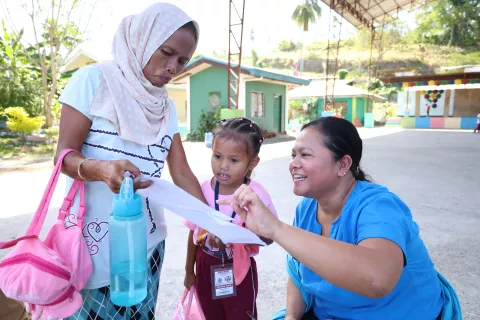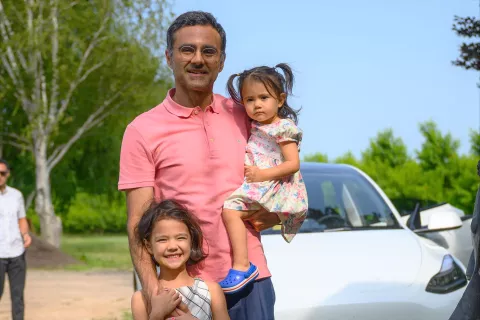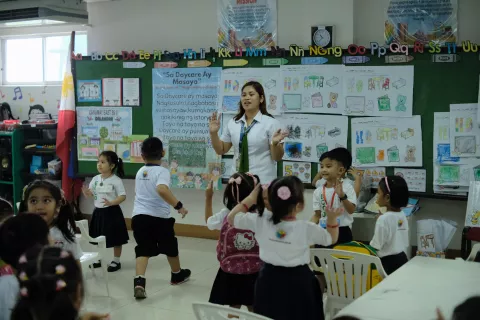Over 1,300 at risk of statelessness receive birth certificates in Maguindanao and BaSulTa

09 Feb. 2024, Philippines – A total of 1,377 Sama Bajau and unregistered children in the context of forced displacement due to armed conflict and their families in four (4) far-flung municipalities located in Maguindanao, Basilan, Sulu, and Tawi-Tawi received their birth certificates in 2023.
The 2020 Census of Population and Housing released by Philippines Statistic Authority stated that Bangsamoro Autonomous Region in Muslim Mindanao (BARMM) posted the lowest proportion of persons with registered births at 77% of the household population which corresponds to reportedly 1.10 million persons whose births were unregistered.
UNHCR, the UN Refugee Agency, and UNICEF have been supporting BARMM through its Ministry of Social Services and Development (MSSD) to register births in the region. Implemented under the UNHCR-UNICEF Joint Strategy for Addressing Childhood Statelessness and in line with the Philippine Government’s implementation of its National Action Plan to End Statelessness, since 2019, the initiative has helped more than 4,000 individuals in areas that experience recurring conflict and cyclical displacement receive their birth certificates.
“Having a birth certificate facilitates the processes towards gaining nationality, which is a fundamental right of every human being. UNHCR is grateful for the continued cooperation of all our partners in the #IBelong Campaign efforts,” said UNHCR Philippines Head of National Office, Maria Ermina Valdeavilla-Gallardo.
“In addition to giving children their right to a name and a nationality, birth certificates protect children from being trafficked, recruited into conflict, forced in child labour, and being separated from their families. Governments also rely on accurate data on children for better planning and allocation of resources,” said UNICEF Philippines Representative Oyunsaikhan Dendevnorov.
Aside from providing support during the conduct of actual birth registration, local government units also received equipment for digitization of the processes at the Local Civil Registrar’s level, as well as advocacy campaign materials that highlight the importance of birth registration. Moreover, advocacy activities on birth registration were carried out at the community level through the leadership of the Bangsamoro Youth Commission (BYC) and selected youth networks.
“Our local civil registrars have received training, and the municipality has also been given equipment to digitize the processing of birth certificates. These documents are critical for availing social services from different agencies,” said Minister Raissa Jajurie of the BARMM Ministry Social Services and Development.
By providing capacity building support through training and equipment, and offering birth registration free of charge, populations that have been identified to be at risk of statelessness such as the Sama Bajau and unregistered children in the context of displacement due to armed conflict can now easily register and get their birth certificates. This gives them a legal identity and eases their access to education, livelihood, health care, and other social services.
Support from the birth registration initiative is priceless to remote areas such as the island municipality of Tabuan Lasa in Basilan, where the local government believes that the initiative will be able to drastically improve the community’s access to civil documentation.
“Before, only around 20% of the people of Tabuan Lasa had access to birth registration, being one of the most remote municipalities. Now we have this birth registration as a long-time program where we envision newborns to be registered immediately after birth,” said Tabuan Lasa Mayor Moner Manisan.
Similarly, for Maimbung in Sulu where annual birth registration was pegged to have increased on average by 3,000 since the service was offered for free, Municipal Civil Registrar Muayzin Kuhutan said that the initiative is able to reach populations like the Sama Bajaus, who are at risk of statelessness due to their itinerant lifestyle, frequent border-crossings, and generations of non-registration of birth.
“Our goal is for 99% of the people in Maimbung to be registered,” said Kuhutan.
Minister Jajurie expressed optimism that the initiative will provide capacity to many more BARMM municipalities to implement birth registration activities themselves.
“We reiterate our call to partner LGUs: continue to carry out our responsibility and duty to protect the welfare of the children in our municipalities.”
In 2024, UNHCR, in collaboration with UNICEF and MSSD, will continue with its efforts to reach more populations at risk of statelessness. By bringing the birth registration initiative to more communities and improving the capacity of local civil registrars through digitization, eventually, birth certificates will no longer be out of reach to distant municipalities in the Bangsamoro region and more children and families will be given the chance to say #IBelong.
Media contacts
Additional resources
ABOUT UNHCR
The United Nations High Commissioner for Refugees (UNHCR), the UN Refugee Agency, is a global organization dedicated to saving lives, protecting rights and building a better future for people forced to flee their homes because of conflict and persecution. We lead international action to protect refugees, forcibly displaced communities and stateless people. We deliver life-saving assistance, help safeguard fundamental human rights, and develop solutions that ensure people have a safe place called home where they can build a better future. We also work with States to ensure that stateless people are granted a nationality. We work in over 130 countries, using our expertise to protect and care for millions.
About UNICEF
UNICEF promotes the rights and wellbeing of every child, in everything we do. Together with our partners, we work in 190 countries and territories to translate that commitment into practical action, focusing special effort on reaching the most vulnerable and excluded children, to the benefit of all children, everywhere.
For more information about UNICEF and its work for children in the Philippines, visit www.unicef.ph.
Follow UNICEF Philippines on Facebook, Instagram, LinkedIn, TikTok and Twitter and YouTube.
ABOUT THE #IBELONG CAMPAIGN TO END STATELESSNESS BY 2024
The #IBelong Campaign was launched in 2014 and aims to end statelessness in 10 years by identifying and protecting stateless people, resolving existing situations of statelessness, and preventing the emergence of new cases. It directly advances the UN’s Sustainable Development Goal (SDG) 16.9: By 2030, provide legal identity for all, including birth registration.





